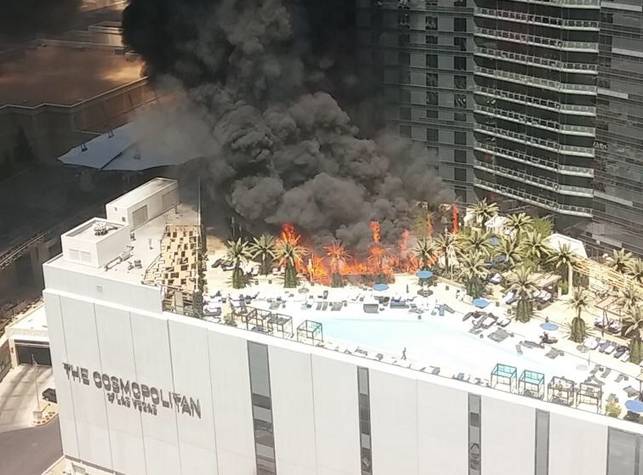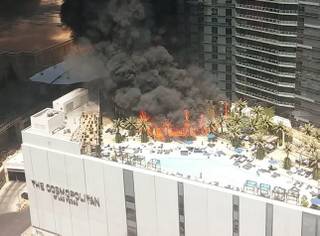The artificial palm trees that fueled a fast-burning outdoor fire at the Cosmopolitan this summer would not have passed muster for use indoors, Clark County said today, but the county is not yet pushing for any legal changes as a result.
The county said tests conducted on the fake trees involved in the July fire showed that their materials did not meet indoor fire resistance standards. But outdoor landscaping and decorative foliage are not regulated by locally adopted national codes, and the county said its building department has not recommended any code changes at the moment.
Still, Ron Lynn, director of the county’s Department of Building and Fire Prevention, shared the results of the tests with the resort industry “as a precautionary measure,” a county statement said. In the statement, officials said the tests “do raise some concerns” about fabricated outdoor plants.
“While it is not always possible to extrapolate one material or assembly to another, it should stimulate some examination concerning artificial foliage,” Lynn said in a notice to resorts dated today. “It is suggested that if you have any such features outside your building, you may want to consider similar testing and/or removal.”
The fronds of the fake trees were made of plastic, while their trunks consisted of metal, polyurethane foam and fiberglass resin, according to the county.
The trees’ material “would not be allowed for use inside buildings or as exterior components of buildings,” the statement said.
Lynn said in an interview that he consulted peers from other cities including Los Angeles, San Francisco and San Diego, as well as state fire marshals from Nevada and California. Based on those conversations, Lynn said he is not aware of anyone else who regulates artificial outdoor foliage, meaning there are no standards for doing so.
Lynn said it would likely be difficult to enforce such standards, but that resorts would still be wise to examine their fake outdoor plants in light of what happened at the Cosmopolitan.
“The responsibility for everything that takes place upon a property (is on) the owners of that property — regardless of whether it’s regulated by a specific code or not,” he said. “It is perhaps prudent that they consider what transpired.”
In response to the county’s findings, the Cosmopolitan issued a statement saying it was being proactive about safety measures for guests and employees, whom the resort refers to as CoStars, and that the resort is in the process of removing all outdoor fake plants.
"The Cosmopolitan of Las Vegas has intently taken proactive and preventative measures to ensure the continued and improved safety and security of our guests and CoStars,” the statement said. “The resort is committed to executing the complete removal of all outdoor artificial foliage by early next year. To date, more than half of artificial foliage has been removed.”
The fake trees quickly ignited during a July 25 blaze at the Cosmopolitan’s Bamboo Pool, which lasted for 30 minutes. Greg Cassell, the Clark County fire chief, said in August that “improperly discarded cigarettes” were found on the pool deck but that the fire department could not say for certain whether they were the cause. He said that meant the cause of the fire would be classified as “undetermined.”
The Cosmopolitan said in its latest quarterly reportfiled with the Securities and Exchange Commission that it had written off $300,000 of damaged or destroyed property and equipment. The resort filed an insurance claim to recover the replacement value of destroyed assets as well as additional expenses and interruption to business, according to the Nov. 13 filing. The Cosmopolitan said it had received a $2.9 million advance on the value of destroyed assets.
“Additional proceeds from our insurance companies may be received in subsequent periods as we continue finalizing the submission of our claim,” the resort’s SEC filing said. “In addition, we may incur additional costs that may not be reimbursed by our insurance companies.”

